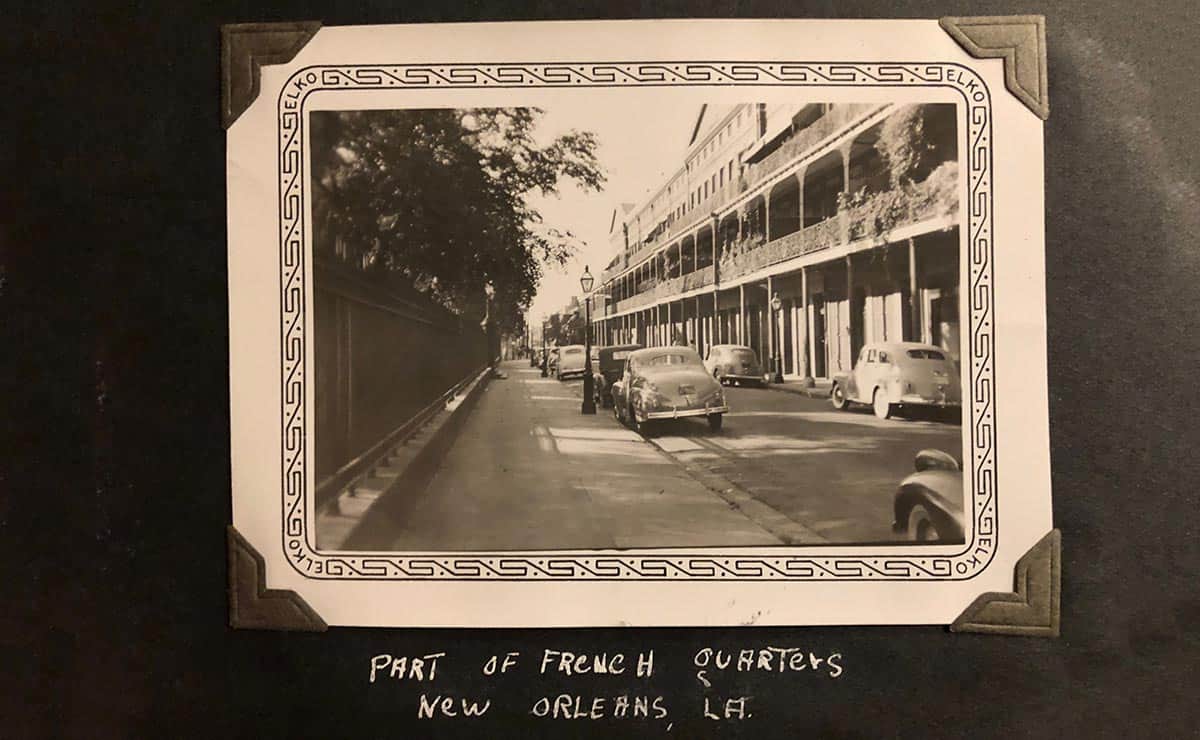
- Historical Date: January 6, 1941
- Location:Camp Beauregard, Louisiana
Guests Entertained, Three Muskegonites Visit New Orleans, Greet New Year
Camp Beauregard, La., Jan. 6 – Christmas dinner in Camp Beauregard was a bright spot in the otherwise dull, snowless holiday for West Michigan soldiers and about 40 guests. Packages of candy and fruit were given to children of guests and members of Companies, G, F, and Headquarters Detachment.
Corporal Paul Dzur attended a formal dance given by Alexandria’s young civic leaders. He escorted Miss Adelade Heller, daughter of Mr. and Mrs. E. H. Heller, prominent residents of Alexandria, to the party, held in the Alexandria city park auditorium.
A tour of the historical city of new Orleans was made by three members of Company G, Privates Muscato, Hammond and LaVanture. At a special center of information they found desks and stationary for writing home, magazines, newspapers and games typical of southern hospitality.
Some 32nd Division soldiers toured the resplendent Canal street, ablaze with holiday decorations, others went into the narrow streets of Vieux Carre and the Old French Quarter. Sunday, with New Orleans overflowing with holiday visitors, and the Sugar bowl sports program in full swing, found the sightseeing soldiers in full numbers lunching at Antoines, at Broussard’s and the Cafe of the Two Sisters.
The truck convoy returned to Camp Beauregard Monday evening.
Welcome 1941
For the first time since 1918, the Thirty-Second Division is fully assembled in one camp area.
The calendar of 1940 is studded with events of particular importance to the division, — 2nd Army maneuvers at Camp McCoy, Wisc., in August; induction of the division into federal service under the call of the President; and tremendous progress of the camp and training program at Camp Beauregard. As 1941 opens the Thirty-Second is one of the few complete divisions assembled within the territorial limits of the United States.
Corporal Bennie Richell is being visited by his father, B. R. Richell of Chicago, who will remain in Alexandria for an indefinite stay.
There is quite a contrast between Muskegon and Alexandria. Here everything is slow and staid. Every one takes his time. Even in eating places, service is leisurely. Time is of no matter. It takes half an hour to get a three-minute steak. There are no quick-order lunches.
The natives here call us “Yanks.” You can distinguish a “Yank” by the way he walks: just as if his train was about to leave.
Anyone May Drive
Every one who drives an automobile must, it seems, blow the horn every five feet, the louder the more effective. It is every man for himself, when the lights flash red, for that means “go.” In the business district are all one way streets – no left turns. There are no bad crack-ups, but most fenders are badly dented. Drivers’ license are not required. The only rule is to get there first, and use your horn.
Some members of Company G have their wives here. They are: Mrs. Lester Compton, Mrs. Elsworth Esh, Mrs. William K. Ziegler, Mrs. Harland D. Hammond, Mrs. Franklin J. Fazakerly and Mrs. Russell A. Broner.
Monday was a day of activity, tents were aired, floors were scrubbed, beds were sunned and a general clean up was in order. The company must be in A-1 condition for the return of the boys.
Camp. Herald M. Hootman arrived in camp after a short vacation in Grand Rapids and Muskegon.
Sgt. Lester Compton and his wife returned from a short trip to Pana, Ill., where they visited relatives and friends.1
This article was written by Sergeant Hart, who has been the source of other articles giving a glimpse into the events and happenings at Camp. We find out that a few of the boys took a trip to New Orleans, where apparently they studied history and ate lunch. I’ll wager that the most interesting details were left out. We also get a look at the differences between northerners and southerners.
Tucked in the middle of the article is a look back at the big moments of the 32nd Division during 1940. Army maneuvers, federal service, and being sent to Louisiana seemed like pretty big moments. They didn’t know, however, what 1941 would bring. In January of 1941, much of Europe had fallen under Axis control. Britain was being bombed, and its citizens were learning to accept that as their new normal. The Axis Powers were winning the war, and our soldiers were training for a war we had not yet joined.
- Unknown newspaper, probably Muskegon Chronicle

0 comments